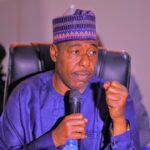The Borno State Government has over the years been working diligently to return the lost glory of education by getting school-aged children back into classrooms.
We have witnessed how the state government took a strategy of establishing ultra-modern basic schools (mega schools) across the state. But, it is evident that the effort was only able to fix a fraction of the damage done by the crisis in the education sector, because the exact targeted individuals are still wandering the streets.
The question is, would the displaced children have access to the newly built schools? Or, how sure is the state government that the targeted groups were the ones benefiting from the already existing ones? I say this because there are necessities in public schools that are still expensive for the IDPs.
Multiple factors are directly barriers for the displaced children to be in school, among which are, a greater number of displaced adolescent boys and girls think that they have outgrown basic school age.
Niger, Burkina Faso, Mali sign treaty to counter ECOWAS
TCN fire incident: Kebbi gov seeks probe over alleged sabotage
There is the issue of financial instability as another factor that makes school the last thing on the mind of an internal displaced person (IDPs), especially now, given the cost of living.
Therefore, I implore that the Borno State government adopt certain strategies for reaching out to these people from all angles in the state capital.
Rukaiyatu Idris wrote from the Department of Mass Communication, University of Maiduguri
 Join Daily Trust WhatsApp Community For Quick Access To News and Happenings Around You.
Join Daily Trust WhatsApp Community For Quick Access To News and Happenings Around You.

